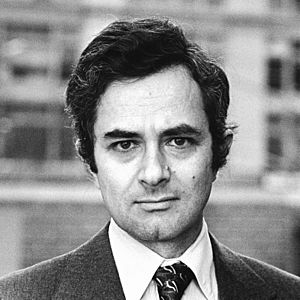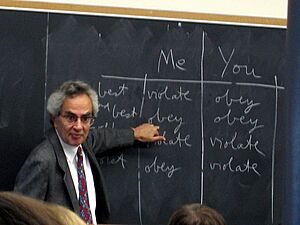Thomas Nagel facts for kids
Quick facts for kids
Thomas Nagel
|
|
|---|---|

Nagel in 1978
|
|
| Born | July 4, 1937 |
| Alma mater | |
| Era | Contemporary philosophy |
|
Notable work
|
|
| Spouse(s) |
|
| Awards |
|
| Scientific career | |
| Institutions | |
| Thesis | Altruism (1963) |
| Doctoral advisor | John Rawls |
| Other academic advisors | J. L. Austin |
| Doctoral students |
|
Thomas Nagel (born July 4, 1937) is an American philosopher. He taught philosophy and law at New York University from 1980 until he retired in 2016. His main interests in philosophy are political philosophy (how governments should work), ethics (what is right and wrong), and philosophy of mind (how our minds work).
Nagel is famous for questioning ideas that try to explain the mind by only looking at physical things. He wrote a well-known essay called "What Is It Like to Be a Bat?" in 1974. He also wrote about how we think about what is right and wrong in books like The Possibility of Altruism (1970). In his 2012 book Mind and Cosmos, he argued against the idea that consciousness (being aware) simply came about through evolution in the way some scientists describe.
Life and Career
Thomas Nagel was born on July 4, 1937, in Belgrade, which was then part of Yugoslavia and is now Serbia. His parents were refugees from Germany. He moved to the United States in 1939 and grew up near New York City.
Nagel studied philosophy at Cornell University, where he earned his first degree in 1958. He then went to the University of Oxford in England and received another degree in philosophy in 1960. Later, he earned his highest degree, a Doctor of Philosophy, from Harvard University in 1963. At Harvard, he studied with John Rawls, who Nagel called "the most important political philosopher of the twentieth century."
After finishing his studies, Nagel taught at the University of California, Berkeley from 1963 to 1966. He then taught at Princeton University from 1966 to 1980. During his time there, he taught many students who also became well-known philosophers. From 1980 until his retirement in 2016, he taught at New York University.
Nagel has received many honors for his work. He is a member of important academic groups like the American Academy of Arts and Sciences. In 2008, he was given the Rolf Schock Prize and the Balzan Prize for his contributions to philosophy.
Philosophical Ideas
Thomas Nagel believes that people naturally want to understand the world in a complete way. However, he thinks it's a mistake to believe there's only one way to understand everything. He argues that for humans, who are limited, a single, perfect way of understanding isn't possible. This is because understanding things isn't always better just because it's more "objective" (like looking at something from a distance).
Understanding the World: Objective vs. Subjective
Nagel points out that modern science helps us understand the world in a very objective way. This means it tries to describe things without relying on how we personally experience them. For example, science describes the mass and shape of objects, which are the same no matter who is looking at them. But other qualities, like taste or color, depend on our senses.
Nagel agrees that science describes a real world that exists whether we are there or not. However, he argues that when we try to understand the mind, a purely objective view (what he calls a "view from nowhere") misses something important. The mind, by its very nature, has a subjective point of view. This means it's about what it's like to be that mind.
What Is It Like to Be a Bat?
Nagel's most famous essay, "What Is It Like to Be a Bat?" (1974), explores this idea. He argues that if an animal, like a bat, has conscious mental states, then "there is something that it is like to be that organism." Bats experience the world through echolocation (using sound waves), which is very different from how humans experience it.
Nagel says that even if we knew everything about a bat's brain and how it works physically, we still wouldn't know what it feels like to be a bat. We can't imagine what it's like to experience the world through echolocation because our human senses are so different. This "what it is like" feeling is the subjective part of consciousness.
He believes that science, which focuses on objective facts, struggles to explain this subjective experience. He thinks that to truly understand the mind, we might need new scientific ideas that can connect the physical world with our inner, subjective experiences.
Consciousness and Evolution
In his 2012 book Mind and Cosmos, Nagel discusses how life and consciousness came to be. He argues that the common scientific view, based on evolution (neo-Darwinism), doesn't fully explain the emergence of consciousness. He suggests that consciousness might be a basic part of nature itself, and that the principles that led to life might involve a purpose or direction, rather than just random chance.
Nagel is an atheist, meaning he does not believe in God. However, he has also said that he disagrees with both those who believe in intelligent design (the idea that life was designed by a creator) and those who say that evolution is the only natural explanation. He believes that the debate about how consciousness arose is a scientific one that needs more exploration.
Ethics: Right and Wrong Actions
Nagel has also had a big impact on ethics (the study of moral principles) and political philosophy. He believes that when we think about what is right, we should use reason and logic.
Helping Others: Altruism
In his book The Possibility of Altruism, Nagel explored why people act to help others, even when it doesn't directly benefit themselves. He argued that when we think about what's right, we should consider reasons that are true for everyone, not just for ourselves. For example, if something is truly valuable, it should be valuable to anyone, not just to one person.
He compared this to how we think about our own future. If you know you'll need car insurance next year, you get it now, even though the need isn't immediate. The future reason (needing insurance) guides your current action. Similarly, he argued that reasons for helping others can be just as strong and guide our actions.
Personal vs. Universal Reasons
Nagel later refined his ideas, talking about "agent-relative" reasons and "agent-neutral" reasons.
- Agent-relative reasons are specific to a person. For example, "Anyone has a reason to honor his or her parents." This reason depends on who your parents are.
- Agent-neutral reasons are true for everyone, no matter who they are. For example, "Anyone has a reason to promote the good of parenthood." This reason applies universally.
He believes that when we think about ethics, we should try to see things from an objective, universal viewpoint. This means taking other people's reasons and values as seriously as our own. However, he also believes that our personal point of view is important and that we don't have to always act in the most objective way possible. We can balance the demands of others with our own personal needs and goals.
Fairness in Society
Nagel's ideas about fairness lead into political philosophy. He looked closely at John Rawls's theory of justice, which suggests how a fair society should be organized. Nagel felt that Rawls's ideas about equality, while good, might not go far enough. He argued that a government, as a collective agent, has a special responsibility to address inequalities. He believed that societies should work towards more demanding ideas of equality to truly respect everyone's needs.
Personal Life
Thomas Nagel was married to Doris Blum from 1954 to 1973. He later married Anne Hollander in 1979, who passed away in 2014.
Awards
- 1996: PEN/Diamonstein-Spielvogel Award for the Art of the Essay
- 2006: Distinguished Achievement Award of the Mellon Foundation
- 2008: Balzan Prize in Moral Philosophy
- 2008: Rolf Schock Prize in Logic and Philosophy
Selected Publications
- The Possibility of Altruism (1970)
- "What Is It Like to Be a Bat?" (1974)
- The View from Nowhere (1986)
- Mind and Cosmos (2012)
See also
 In Spanish: Thomas Nagel para niños
In Spanish: Thomas Nagel para niños
- American philosophy
- List of American philosophers
- New York University Department of Philosophy
- David Chalmers
- Hard problem of consciousness
- Knowledge argument


